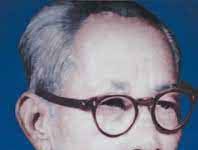Samuel Beckett-Brief Biography
Samuel Beckett
Samuel Beckett-Brief Biography
Samuel Beckett was one of the popular French dramatists of the twentieth century. As a dramatist, he belonged to the Absurd school, the dramatists of whose school wrote dramas after their own whimsical theme and style repudiating all the conventional theories and techniques of drama.
Samuel Beckett was born on the 13th of April 1906 at Foxrock near Dublin, Ireland. His parents were protestant. He was educated in Ulster at Portora Royal School and then went to Trinity College, Dublin where he studied modern languages and took his Master’s Degree from the same university. In 1928, he became a lecturer in the subject of English in Paris. In 1931, he gave up his university life and moved to London, wandered around Europe and finally settled in Paris in 1937.
In Paris, Samuel Beckett met James Joyce, a famous novelist of his time. During Beckett’s life in Paris, he began his literary career first as an essayist. He wrote essays on Dante, Burno Vico and so on. His essays impressed James Joyce considerably and thought that Beckett had a promise. Both, socially and intellectually, had good assimilation. Joyce and Beckett both met each other often. During these times, Joyce’s daughter Miss Lucia fell in love with Beckett. But Beckett did not respond to her feelings. Instead, he said that he had frequented their house primarily to see her father.
There was too much of a natural bond between the two men. Both of them were chronic victims of depression. Joyce suffered from an elder man’s depression which grows from a lifetime of private dedication to his own genius and the public rejection of it. Beckett’s gloom, on the contrary, seemed a condition he was born to. Depression had also been Beckett’s constant theme, emerging more and more powerfully as his age and authority impressed until he reached the climax of despair.
During World War II, Samuel Beckett took part in the French Resistance for nearly two years and for the next two and a half years he had to hide from the ‘Gestapo’ (the secret German police during the time of Hitler). The circumstance under which he joined the French Resistance threw much light on his character. When the Germans invaded Poland in 1939, Beckett happened to be in Ireland to spend a holiday for a month with his mother. But he hurried back to his home, Paris. He felt soon so much annoyed with the Nazis. By the end of 1940, he had become actively involved with the Resistance group with agents all over French gathering details of the movements of the German troops. In August 1942, the group was betrayed and out of 80 members, fewer than 20 survived. Beckett and his wife Suzanne were alerted and got away barely half an hour before the Gestapo, come for them. For the next four months, they were on the run making their way through every territory, liable at any moment to be recognized. At last, they were able to cross into unoccupied French, reaching a village high in the mountains behind Avignon. There they remained hidden until the German collapsed. Beckett used to work as a farm labourer during the daytime and at night he wrote his fantastic comic novel called ‘Witt’. His writing helped him take his mind off the war and the German occupation. For these three years, he had to earn his livelihood, particularly by means of a farm labourer. Soon he hurried back to Ireland to see his mother. But then he was so reduced physically that many of his old friends failed to recognize him. More than most people, Beckett had the experience of living close to death every minute of the day and saw people butchered suddenly and ruthlessly, by the Germans. He had met the personal experience of fear, suffering and hardship. But he showed a firm determination to stay alive.
In 1945, Samuel Beckett returned to his permanent home in Paris and began to dedicate himself to the act of writing. In the next five years, he wrote a series of fine plays as: ‘Eleutheria’, ‘Waiting for Godot’ and ‘Endgame’; the novels- ‘Molloy’, ‘Malone Dies’, ‘The Unnamable’ and ‘Mercier et Camier’. He also wrote some short stories.
The works published by Samuel Beckett up to 1950 could hardly attract any attention. When the novel ‘Molloy’ was published it created the air. But his triumph and reputation came when his best work, ‘The Waiting for Godot’ a play appeared in printed form in 1952. Within the next five years of its production, this play was translated into twenty different languages and was performed on the stages in more than twenty countries of the world. Finally, it brought him the world-famous Novel Prize for literature.
Besides these works, Samuel Beckett wrote some plays for Radio, Television and Cinema. But his reputation remains only in his play ‘Waiting for Godot’.
As a dramatist, Samuel Beckett was an innovator as he repudiated all the conventional theories and techniques and wrote after his own innovative theories and techniques on the theme of complex human nature imposing comic vein to tragic problems. His dramas are roughly grouped in the Absurd genre. Moreover, as a dramatist, he may not be great but one amongst many who won popularity during his lifetime. 0 0 0
Samuel Beckett
N.B. The article ‘Samuel Beckett-Brief Biography’ originally belongs to the book ‘The World Writers-Brief Biographies‘ by Menonim Menonimus.
Samuel Beckett
Books of Composition by M. Menonimus:
- Advertisement Writing
- Amplification Writing
- Note Making
- Paragraph Writing
- Notice Writing
- Passage Comprehension
- The Art of Poster Writing
- The Art of Letter Writing
- Report Writing
- Story Writing
- Substance Writing
- School Essays Part-I
- School Essays Part-II
- School English Grammar Part-I
- School English Grammar Part-II..
Books of S. Story by M. Menonimus:
Related Search:











